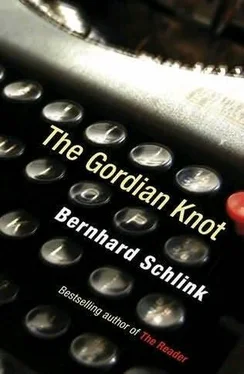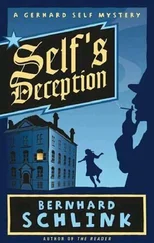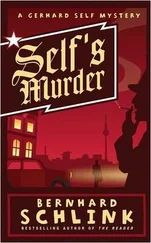In the pharmacy he stood a few minutes in line, waiting his turn. When he entered he had said “bonjour” without putting on a friendly, happy face, and as he stood and waited, his face showed neither expectation nor impatience-nor any interest in Madame Revol’s small talk with the other customers. He felt that his face was like an empty page.
“Could I please have a box of Dovestan?”
“Monsieur would do better to have a beer or a glass of red wine before going to bed. Dovestan is a dangerous drug. I read that in Germany or Italy you can’t even get it without a prescription anymore.”
He hadn’t intended to reply, but Madame Revol was showing no sign of going to the medicine shelf. She looked at him with a worried, motherly expression, waiting for him to say something. He put on a playful smile. “And that’s exactly why I live in France, Madame,” he said, laughing. “But jokes aside, I don’t seem to get any sleep when there’s a full moon. And I’d hate to think what would happen to my liver with all the red wine I’d have to gulp down.”
The instant Madame Revol gave him the pills he knew he wouldn’t take them. Suicide? No, not him. Those Russians, Poles, Bulnakov, Françoise-they had another thing coming! Wasn’t he holding all the cards? Wasn’t it up to him to deliver or not to deliver, to go to the police or not, to string Bulnakov along, and make him pay?
He drank a glass of white wine in the Bar de l’Étang and then another. Back at home he went into his study. The desk was standing upright again, the plans laid out, the camera gone. Françoise had clearly finished taking pictures that morning. Georg put in a call to his office in Marseille. His secretary had been expecting him, but had managed things on her own, rescheduling appointments and appeasing clients. Then he dialed Bulnakov’s number.
“Hello?”
“Hello, Polger speaking. We need to talk. I’d like to drop by at four.”
“Drop by, my young friend, drop by! Though I must say you’re sounding a little secretive. What’s all this about?”
So Françoise hadn’t told him anything. Was she going to tell him, or didn’t she intend to?
“We can talk about that later. Till then, Monsieur.” Georg hung up. He had to go for it, use the element of surprise, confuse his opponent-he would make Bulnakov sweat.
And, in fact, when Georg turned up at four Bulnakov did have large sweaty patches under his arms. The doors were open, Françoise was not at her desk, and Bulnakov was sitting regally in his office, his jacket draped over the back of his chair, the top buttons of his shirt and pants undone. Then he gets up, buttons his pants, and tucks in his shirt , shot through Georg’s mind.
“Come in, my young friend. I’m trying to get some fresh air in here, but I can’t get a draft going and lose heat.” He heaved himself up out of the chair, buttoned his pants, and tucked in his shirt. Georg was jealous, hurt, furious. He didn’t shake Bulnakov’s hand.
“The game is over, Monsieur,” Georg said, sitting down on the edge of the table by the sofas. He towered over Bulnakov, who had sat down again at his desk.
“What game are you talking about?”
“Whatever it is, I’m no longer playing along. It’s up to you whether I go to the police or not. If I’m not to go, then Françoise’s brother must be pardoned and given authorization to leave Poland. You have three days.”
Bulnakov gave Georg a friendly look. Laugh lines crinkled the corners of his eyes, his mouth widened, his plump cheeks shone. He squeezed the tip of his nose, lost in thought. “Is this the same boy who stood before me in this office only a few months ago? No, it isn’t. You have become a man, my young friend. I like you. From what I see, the thing you are calling my ‘game’ has done you quite a bit of good. But now you want out.” He shook his head, puffed up his cheeks, and blew the air out between his lips. “No, my young friend. Our train is on a roll, it’s rolling at great speed, and you can’t get off. If you try to jump, you’ll end up with broken bones. But a train moving fast also gets where it’s going quickly. Just be a little patient.”
“Why should I?”
“What is it you want to tell the police?”
The conversation wasn’t going the way Georg had imagined. He felt he was losing the upper hand. “Leave that up to me,” he said. “You might think I don’t have proof. But perhaps I do. And then again I might only have my story and a few scraps of evidence. But once the police know where to look and what to look for, they’ll find the rest too. I’ve seen the efficiency of the Polish secret service-now you’ll see how efficient the French are.”
“How prettily you craft your sentences. We might let the French police find this or that roll of film with your fingerprints on it. And you can be sure we will let them find the fender of your yellow Peugeot-the one that forced Maurin’s Mercedes off the road-not to mention that we’ll point the police in the direction of the garage in Grenoble that repaired the damage to your car.” Bulnakov’s tone was still friendly. “Why make yourself and Françoise unhappy? A few more weeks and it’ll all be over. We’ll part as good friends-or good enemies-either way, we’ll part amicably. Things will work out for her brother too-he’s quite obstinate, that one, not to mention thick-skulled. And if you and Françoise want to marry: why not? You’re the right age.”
Georg sat there stunned. There was a sound of footsteps. He turned and saw Françoise standing in the doorway.
“Is it true, Françoise, that my fingerprints are on the negatives?”
She looked from Georg to Bulnakov and back.
“I had to do it that way. You take so many pictures-I used your film cans.” She bit her lip.
“We were in Lyon when Maurin… when he was murdered. I’m sure the people at the conference and the hotel receptionist will remember me.”
“Tell him, Françoise.”
She hung her head. “The night when Maurin… That night we weren’t in Lyon anymore. We weren’t in the hotel either. We were out in that meadow near Gordes.”
“But you can back me up…” Georg didn’t finish the sentence. He was beginning to understand. Bulnakov was frowning, yet was looking at Georg not with irritation, but with pity. Françoise’s face was cold and unapproachable. “This can’t be, Brown Eyes. I can’t believe you did all this on purpose.” He was saying it more to himself than to her. Then he jumped up, seized her, and shook her. “Tell me it isn’t true! Tell me it isn’t! Tell me!” As if his shaking and shouting would break the armor that encased Françoise, Françoise whom he had held in his arms, who had opened up to him, to whom he had opened up, the real Françoise.
“Why did you have to ruin everything?” she said. “Why couldn’t you just leave things the way they were?” She didn’t try to defend herself, but kept complaining in her thin, shrill child’s voice and remained unapproachable. Only when he let her go, she shouted: “I won’t take this from you, Georg! I won’t! I never promised you anything! I never played games! I was me, and you were you! You were the one who wouldn’t listen and wouldn’t face reality! It was you who got your hopes up! And now you see that there was nothing there! Don’t think I don’t know what you’re playing at: you’ve ruined everything so you can get back at me! You were miserable because you couldn’t have me, and so you want to go to the police so I’ll be miserable too. Don’t think for a moment that I’m going to side with you or back you up. If you go to the police, you’ve lost me!” She was shaking.
“What reality wouldn’t I face?” Georg asked. He was grimacing like a madman, but making a last-ditch effort.
Читать дальше












